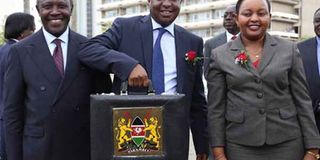Police, education given top priority

From left: Parliamentary Budget and Appropriations Committee chair Mutava Musyimi, National Treasury Cabinet Secretary Henry Rotich and Devolution Cabinet Secretary Anne Waiguru pose for a photo at Parliament buildings in Nairobi on June 12, 2014 before the budget reading. FILE PHOTO | BILLY MUTAI | NATION MEDIA GROUP
What you need to know:
- To cut the cost of living and spread the benefits of the economic growth, the government has focused on agriculture, which received Sh9.5 billion for irrigation projects, with Sh3.5 billion being allocated to the Galana/Kulalu irrigation project to open up 10,000 acres in the 1 million irrigation scheme.
- On education, he proposed that Sh28.2 billion be set aside for free day secondary education, Sh13.5 billion for free primary education and Sh55 billion for university education.
The Jubilee government Thursday dished out goodies as it tried to appease the public over the rising cost of living.
In his Budget speech on Thursday, National Treasury Cabinet Secretary Henry Rotich also offered incentives to investors in the race to revive the faltering economy and create more jobs.
The Sh1.8 trillion Budget for 2014-2015 focused on dealing with insecurity, high cost of living, unemployment and cushioning the poor through cash transfers.
“Kenyans have responded to our call for Budget proposals and they have requested us to address through this Budget, the issue of insecurity, the high cost of living, joblessness, protecting the vulnerable and wastage in public expenditure across the entire government,” Mr Rotich told Parliament.
Security received Sh66.2 billion for policing services while the Kenya Defence Forces got Sh71.3 billion. The National Intelligence Service was allocated Sh17.4 billion.
Some Sh6.7 billion will be used to lease 2,700 vehicles and helicopters, another Sh3.3 billion for operations and another Sh2.9 billion for recruitment of 10,000 police officers. The police will also benefit from Sh1.6 billion in a medical insurance scheme among other allocations.
“We are rolling out a surveillance system throughout the country to deter criminals and terrorists,” Mr Rotich said.
To cut the cost of living and spread the benefits of the economic growth, the government has focused on agriculture, which received Sh9.5 billion for irrigation projects, with Sh3.5 billion being allocated to the Galana/Kulalu irrigation project to open up 10,000 acres in the 1 million irrigation scheme.
Another Sh3 billion was given as subsidy for fertilizer and other farm inputs. The strategic grain reserves will get Sh2.7 billion to shore up its grain reserves.
Fisheries development was given Sh1 billion while the Kenya Meat Commission, which has been facing financial challenges will get Sh700 million to revive its operations.
The Pyrethrum sector will get Sh300 million to jump start activities after a period of decline. Some Sh8.2 billion was also allocated for construction of water pans and another Sh4.1 billion for water systems and sanitation. Another Sh500 million will be used to complete construction work on dams initiated under the economic stimulus programme.
“Agriculture is the best positioned to open opportunities across the country and sustain equitable development and prosperity,” Mr Rotich said. “It will increase food supply, reduce food prices and bring down cost of living, create employment and promote overall rural development.”
The youth also received special attention with Sh8.1 billion for the National Youth Service which will recruit and train 21,870 people who will train another 227,670 youth to work in community development projects, particularly dam construction.
The elderly, disabled and the vulnerable children also received attention in the Budget. The orphans and vulnerable children will get Sh7.2 billion while the elderly were allocated Sh4.9 billion. Some Sh800 million will go to the extremely disabled, Sh300 million for rehabilitation of street families and Sh600 million to internally displaced persons. The Child Welfare Society, which was recently given the mandate to deal with adoption cases, was allocated Sh800 million.
To cut wastage in government expenditure, from July the procurement will be done electronically.
“Procuring electronically will ensure the days of inflated prices will be a thing of the past,” Mr Rotich said.
Other measures he outlined included using the Digital Payment Gateway and Treasury Single Account that will enable the tracking of cash flow and transactions at all levels of government. The government will also enforce cost benchmarks to ensure the public gets value for money on goods and services.
“To combat wastage, budget allocations for consultancy services, travel and hospitality have been curtailed, which will contribute to savings,” Mr Rotich said.
On education, he proposed that Sh28.2 billion be set aside for free day secondary education, Sh13.5 billion for free primary education and Sh55 billion for university education.
Sh17.4 billion has been proposed for deployment of laptops to schools, developing digital content, building capacity of teachers and rolling out computer laboratory for class four to eight in all schools.
Some Sh41 billion will be spent on ongoing road construction projects while another Sh22.4 billion will be allocated for road maintenance.
Another Sh19.4 billion will be used to pay for the standard gauge railway from Mombasa to Nairobi while the Jomo Kenyatta International Airport commuter rail will be allocated Sh3.5 billion.





